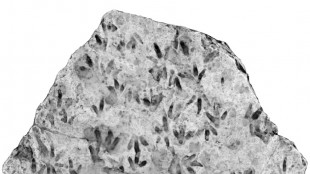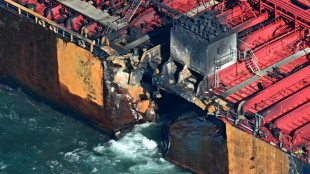
-
 US tariffs of 25% on steel, aluminum imports take effect
US tariffs of 25% on steel, aluminum imports take effect
-
Trove of dinosaur footprints found at Australian school

-
 Mongolia's children choke in toxic pollution
Mongolia's children choke in toxic pollution
-
Rubio heads to Canada as Trump wages trade war

-
 South Korean pastor vows revolt against Yoon's impeachment
South Korean pastor vows revolt against Yoon's impeachment
-
Pakistan to launch 'full-scale' operation to free train hostages

-
 Syria determined to 'prevent unlawful revenge' says fact-finding committee
Syria determined to 'prevent unlawful revenge' says fact-finding committee
-
Most Asian stocks drop as Trump trade policy sows uncertainty

-
 Morocco fights measles outbreak amid vaccine misinformation
Morocco fights measles outbreak amid vaccine misinformation
-
Garland stars as comeback Cavs bag 15th straight with defeat of Nets

-
 Hamilton eyes dream Ferrari start as F1 revs up in Melbourne
Hamilton eyes dream Ferrari start as F1 revs up in Melbourne
-
Talk of the town: Iconic covers of the New Yorker magazine

-
 The New Yorker, a US institution, celebrates 100 years of goings on
The New Yorker, a US institution, celebrates 100 years of goings on
-
Cuban kids resist reggaeton, one verse at a time

-
 NASA fires chief scientist, more Trump cuts to come
NASA fires chief scientist, more Trump cuts to come
-
Denmark's Rune ready to break out of tennis doldrums

-
 Transformed PSG make statement by ousting Liverpool from Champions League
Transformed PSG make statement by ousting Liverpool from Champions League
-
PSG down Liverpool on penalties in Champions League, Bayern thrash Leverkusen

-
 Liverpool 'ran out of luck' against PSG, says Slot
Liverpool 'ran out of luck' against PSG, says Slot
-
Swiatek surges into quarter-finals at rainy Indian Wells, Rune tops Tsitsipas

-
 PSG stun Liverpool on penalties to make Champions League quarters
PSG stun Liverpool on penalties to make Champions League quarters
-
PSG beat Liverpool on penalties to reach Champions League quarter-finals

-
 Inter cruise into Champions League quarters and titanic Bayern clash
Inter cruise into Champions League quarters and titanic Bayern clash
-
Trump has 'bolstered' PGA-LIV reunification talks: Monahan

-
 Kane leads Bayern past Leverkusen into Champions League last eight
Kane leads Bayern past Leverkusen into Champions League last eight
-
Defending champ Swiatek surges into quarter-finals at rainy Indian Wells

-
 Piastri signs long-term extension with McLaren
Piastri signs long-term extension with McLaren
-
Trump talks up Tesla in White House show of support for Musk

-
 US trades barbs with Canada as steel, aluminum tariffs loom
US trades barbs with Canada as steel, aluminum tariffs loom
-
Oil companies greet Trump return, muted on tariffs

-
 Italian defence firm Leonardo to boost capacity amid geopolitical risks
Italian defence firm Leonardo to boost capacity amid geopolitical risks
-
Over 100 hostages freed in deadly Pakistan train siege

-
 Ukraine backs 30-day ceasefire as US ends aid freeze
Ukraine backs 30-day ceasefire as US ends aid freeze
-
Swiatek powers into Indian Wells quarter-finals

-
 Tiger Woods has surgery for ruptured Achilles tendon
Tiger Woods has surgery for ruptured Achilles tendon
-
Trump burnishes Tesla at White House in show of support for Musk

-
 Macron urges allies to plan 'credible security guarantees' for Ukraine
Macron urges allies to plan 'credible security guarantees' for Ukraine
-
Yamal, Raphinha fire Barca past Benfica into Champions League last eight

-
 Trump may rethink plans to double Canada steel, aluminum tariffs
Trump may rethink plans to double Canada steel, aluminum tariffs
-
Maradona medical team on trial for 'horror theater' of his death

-
 UK makes manslaughter arrest of ship captain over North Sea crash
UK makes manslaughter arrest of ship captain over North Sea crash
-
Ukraine backs US proposal for 30-day ceasefire in war with Russia

-
 Mitrovic misses AFC Champions League clash due to irregular heart beat
Mitrovic misses AFC Champions League clash due to irregular heart beat
-
Trump's 'The Apprentice' re-runs hit Amazon

-
 Dozens freed, hundreds still held hostage in deadly Pakistan train siege
Dozens freed, hundreds still held hostage in deadly Pakistan train siege
-
Italian defence firm Leonardo to focus on int'l alliances for growth

-
 Israel kills senior Hezbollah militant, frees four Lebanese prisoners
Israel kills senior Hezbollah militant, frees four Lebanese prisoners
-
Dozens of hostages freed, hundreds still held in Pakistan train seige

-
 Far-right Romania politician loses appeal against presidential vote ban
Far-right Romania politician loses appeal against presidential vote ban
-
Facing Trump and Putin, are the EU's defence plans enough?


Sudan 'political' banknote switch causes cash crunch
Sudan's army-aligned government has issued new banknotes in areas it controls, reportedly aimed at undermining its paramilitary rivals but causing long queues at banks, disrupting trade and entrenching division.
In a country already grappling with war and famine, the swap replaced 500 and 1,000 Sudanese pound banknotes (worth around $0.25 and $0.50 respectively) with new ones in seven states.
The government justified the move as necessary to "protect the national economy and combat criminal counterfeiters".
But for many Sudanese it just caused problems.
In Port Sudan, now the de facto capital, frustration boiled over as banks failed to provide enough new notes.
One 37-year-old woman spent days unsuccessfully trying to get the new money.
"I've been going to the bank four or five times a week to get the new currency. But there is none," she told AFP, requesting anonymity for fear of reprisals.
Grocers, rickshaw drivers, petrol stations and small shop owners are refusing to accept the old currency, preventing many transactions in a country reliant on cash.
"We cannot buy small things from street vendors any more or transport around the city because they refuse the old currency," the woman said.
The currency shift comes 21 months into a war that has devastated the northeast African country's economy and infrastructure, caused famine in some areas, uprooted millions of people and seen the Sudanese pound plunge.
From 500 pounds to the US dollar in April 2023, it now oscillates between 2,000 and 2,500.
- The upper hand -
Finance Minister Gibril Ibrahim defended the switch, saying it aims to "move money into the banking system, ensure the monetary mass enters formal channels as well as prevent counterfeiting and looted funds".
But analysts say it is less about economics and more about gaining the upper hand in the war between army chief Abdel Fattah al-Burhan and his former deputy Mohamed Hamdan Daglo, who leads the paramilitary Rapid Support Forces (RSF).
"The army is trying to weaken the RSF by having a more dominant currency," Matthew Sterling Benson at the London School of Economics and Political Science told AFP.
After the RSF looted banks, the army "wants to control the flow of money" and deprive them of resources, he said.
Sudanese researcher and political analyst Hamid Khalafalla said the army also wants to bolster its war chest.
He said the funds "will definitely be used by the army to finance the ongoing war, including paying soldiers and procuring arms from various countries".
The RSF has banned the new notes in areas it controls, and accused the army of orchestrating a "conspiracy to divide the country".
Kholood Khair, founder of think tank Confluence Advisory, believes that this financial squeeze may accelerate RSF plans to establish a rival currency and administration.
"The move has catalysed the already existing trajectory towards a split," she told AFP.
Sudan is already fragmented: the army holds the north and east and the RSF dominates in the western Darfur region and parts of the south and centre.
Greater Khartoum is carved up between them.
- No-win situation -
For Sudan's population, the move has only compounded their suffering.
Activist Nazik Kabalo, who has coordinated aid in several areas, said supply chains have been severely disrupted.
Farmers, traders and food suppliers rely entirely on cash.
"And if you do not have cash, you cannot buy supplies, needed for aid or for anything else," Kabalo told AFP.
The government has promoted digital banking apps such as Bankak, but many Sudanese cannot access them because of widespread telecommunications outages.
The RSF could be left virtually unscathed, as it deals mostly in foreign currency and has a transnational support network spanning Libya, Chad and the Sahel.
In RSF-held areas, civilians could become further isolated economically, struggling to trade with regions under army control.
"And this is a bad situation when people are at risk of famine, and you need to be able to buy food," Benson said.
Last month, the UN-backed Integrated Food Security Phase Classification review said famine has gripped five areas in Darfur, mostly controlled by the RSF, and parts of the Nuba Mountains in the south.
For Khair, the army and RSF are just trading blows "to score political points".
"It's about creating a governance crisis for the RSF, starving people of currency and services so they turn against their rulers," she said.
"The army introduces a currency and blocks people in RSF areas from services. In response, the RSF talks about creating their own."
G.Schulte--BTB
